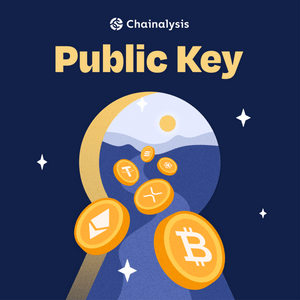What You Need To Know About Crypto and National Security
Cryptocurrency has woven its way into the tapestry of geopolitical tensions, the evolving landscape of national security and the future of strategic policy making
In this engaging episode, Eitan Danon, Content Marketing Manager at Chainalysis, talks about China, Russia and all things national security with Matthew Pines, Director, Security Advisory at SentinelOne, as they demystify the global tensions and cybersecurity implications.
The conversation covers the intersection of Bitcoin and AI, the strategic implications for U.S.-China relations, and the evolving cyber landscape, including cyber deterrence and private sector responsibilities.
With insights into national reserves, the role of stablecoin, and even discussions on UAPs and non-human intelligence, this episode has never ending twists landing on global power dynamics and emerging technologies shaping the future.
Minute-by-minute episode breakdown
2 | Matt’s journey through startups, government contracts and entrance into Bitcoin
4 | Exploring Bitcoin, AI, and geopolitics with the new Trump administration
7 | China's global influence through techno authoritarianism
11 | China's strategy for alternative financial systems and global influence
15 | Global financial interdependence and sanctions in geopolitical conflicts
22 | Cybersecurity challenges and strategic deterrence against China
27 | Factoring in Bitcoin in geopolitical strategy and National Security discussions
33 | Strategic implications of potential Bitcoin reserve and global stablecoin usage
41 | Expectation Value: Matt’s book decrypting AI, and espionage activity in a novel world
43 | UAPs, non-human intelligence, and geopolitical implications for 2025
Related resources
Check out more resources provided by Chainalysis that perfectly complement this episode of the Public Key.
Website: SentinelOne: World-Leading Cybersecurity. Powered by AI
Article: A “Global Economic Reordering:” US-China Competition and Bitcoin as Tool of US Statecraft
Article: Great Power Network Competition & Bitcoin
Book: Expectation Value
Blog: 2025 Crypto Crime Report Preview: $2.2 Billion Stolen from Crypto Platforms in 2024, but Hacked Volumes Stagnate Toward Year-End as DPRK Slows Activity Post-July
Blog: Illicit Volumes Portend Record Year as On-Chain Crime Becomes Increasingly Diverse and Professionalized
Blog: Sui Foundation and Chainalysis Collaborate to Enhance On-Chain Compliance
YouTube: Chainalysis YouTube page
Twitter: Chainalysis Twitter: Building trust in blockchain
Speakers on today’s episode
Eitan Danon **Host** (Content Marketing Manager, Chainalysis)
Matthew Pines (Director, Security Advisory, SentinelOne)
This website may contain links to third-party sites that are not under the control of Chainalysis, Inc. or its affiliates (collectively “Chainalysis”). Access to such information does not imply association with, endorsement of, approval of, or recommendation by Chainalysis of the site or its operators, and Chainalysis is not responsible for the products, services, or other content hosted therein.
Our podcasts are for informational purposes only, and are not intended to provide legal, tax, financial, or investment advice. Listeners should consult their own advisors before making these types of decisions. Chainalysis has no responsibility or liability for any decision made or any other acts or omissions in connection with your use of this material.
Chainalysis does not guarantee or warrant the accuracy, completeness, timeliness, suitability or validity of the information in any particular podcast and will not be responsible for any claim attributable to errors, omissions, or other inaccuracies of any part of such material.
Unless stated otherwise, reference to any specific product or entity does not constitute an endorsement or recommendation by Chainalysis. The views expressed by guests are their own and their appearance on the program does not imply an endorsement of them or any entity they represent. Views and opinions expressed by Chainalysis employees are those of the employees and do not necessarily reflect the views of the company.

